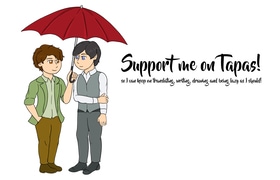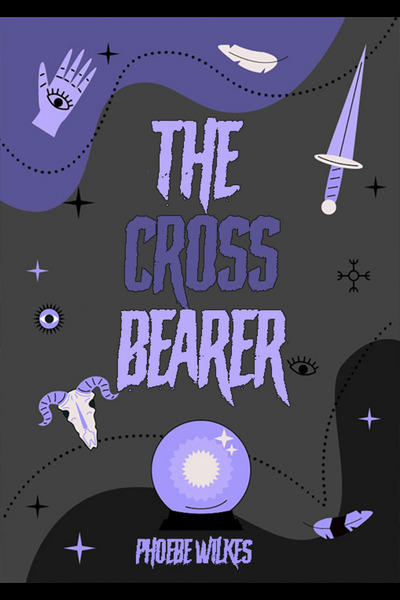However it was, I didn't mind. If I could get some answers, I didn’t care about staying outside.
"I know you’ve already spoken with the lieutenant, and to a greater or lesser extent, I’m aware of what was said," I had taken a look at the brief report Taboada wrote about it, after all. "But I would like to review a couple of things, if it’s not too much trouble."
"What are you planning? I thought it was already established that what happened to Joaquín was an accident."
"Both the doctor and the lieutenant lean more toward this option, it’s true. And I suppose I should say the same, professionally, since I’m here not because anyone ordered me to." That seemed to pique Jimena’s curiosity, as she stopped what she was doing to focus her attention on me. "Now, I haven’t come for any official matter, but to make my own checks: I think there’s something… strange about how your husband died. And I would be very interested in knowing in detail about his last days. Although, as I’ve mentioned, I’m not doing this as a civil guard; if you tell me you don’t want to talk about it, I’ll leave and won’t bring it up again."
"I don’t mind repeating myself, nothing is going to change anyway," the woman sighed. "What do you want to know? Because if you’re looking for someone to blame for what happened, let me tell you I’ve already been there and I don’t find any explanation. Joaquín had no one who wished him harm, nor was he involved in any quarrels."
"I simply would like to know what you remember of that last day you saw him alive. You don’t need to focus on who you think might have wanted to hurt him, just tell me a bit about his routine and how he seemed emotionally."
"Emotionally? He was in a good mood, as usual. Maybe just a bit more tired than usual, since he hadn’t slept well the night before and had to get up early to go to town hall."
"He didn’t sleep well?"
"He’d had insomnia for a couple of days, nothing to really worry about. Joaquín knew how to take care of himself, and the hours of sleep he couldn’t get at night, he made up for during the day."
"Was it common for him to have insomnia?"
"From time to time, in times of stress," Jimena shrugged, it was obvious this was a usual occurrence for her and she didn’t give it much importance. "Though it’s strange, it had been months since it happened, those things can be unpredictable after all. The doctor had prescribed him some pills, for when the insomnia appeared, and I can confirm that Joaquín took them."
"Did you see him take them?"
"He told me he took them, the day before he passed away," Jimena emphasized, making it clear that she hadn’t seen him but trusted his word. "That morning I asked him how he was feeling, if he had managed to rest, and he said yes. The truth is, I didn’t believe him; he looked tired. But it was already getting late for him to leave for work, and Joaquín didn’t like to miss work, so I let him go without asking more questions."
Maybe I should have asked more; it was clear she regretted this.
"Was there a lot of work at the town hall?" I interjected now, wanting to learn more about the schedule and the type of tasks expected from him.
"His work was administrative, mostly: He was in charge of the municipal archives, keeping them organized and ensuring that all the permits and documents were in order. If he had to be at the town hall early, it was because he also helped the public, assisting with license renewals or any other bureaucratic tasks."
"Certainly, I remember passing by your husband’s counter shortly after I moved to the village. I barely spoke to him for a few minutes, but he seemed like a pleasant and efficient person."
And I didn’t say this just for the sake of saying it; I truly remembered Joaquín in that setting. It was just that it was such a brief interaction that, as could be expected, I quickly forgot.
"He liked that kind of work," Jimena continued, with a small smile as she recalled it. "That’s why he went to the city to study as soon as he finished school here, you know? He originally planned to become a lawyer, but he didn’t get the score to enter the school he wanted and ended up working as an archivist in a law firm. Later, when he came back to the village, it was Narciso who offered him a job at the town hall."
"That was before he became mayor, right?"
If I had barely interacted with Joaquín, I had even less with Narciso Quirós, the current mayor of the small collection of villages that made up this region.
"Much before, it must have been about fifteen years ago," she confirmed. "At that time, Narciso wasn’t even really involved in politics, he was just working as a mechanic for whoever needed him. He and Joaquín were old school friends, and it happened that since Narciso had recently done some repairs on a vehicle belonging to the town hall, he learned they were looking for someone to fill an open position."
"It was an opportune coincidence," I reflected out loud. "I’m glad it worked out well."
"Joaquín had that job ever since, with little change. At some point, he was offered to run for the next local elections or at least take on a more important role in decision-making. But he was never interested in politics and always declined the offers."
"And with Narciso as mayor? I had heard Joaquín was almost like his right-hand man."
"He did the tasks of a secretary, mostly. At most, he might have given some advice; I insist, he preferred not to get involved in those matters. His friend holding an elected office didn’t change anything."
No, I assumed it didn’t. At least I had never heard any complaints about how Joaquín handled his duties at the town hall. And, although people tended to complain about the mayor —who, after all, was the one calling the shots— if there had been any other public official involved in something that had gone wrong, I had no doubt I would have heard about it. Whether before or after Joaquín’s death.
"So, did he spend the whole morning at the town hall?"
"I imagine so, like every other day. Then he would have lunch in the village, at the usual tavern, and after that, he’d work a bit more until he finished his shift around four in the afternoon. Sometimes he made a work visit or went to see his family before heading home, but usually, he came straight back on foot."
"Including this day?"
"When he came back home, around seven in the evening, he told me he was late because he had walked through the vineyards. He wanted to stop and talk to Abel, one of his cousins, who helps us with the harvest every year and then provides us with our share of wine reserves."
"I thought you didn’t do that."
"We don’t. Not actively, anyway. But we have a couple of plots that aren’t just Joaquín’s, they are shared by several family members. So in our case, since Joaquín was never too keen on working in the vineyards, he usually let some relatives harvest his share of the land for him. And, for all practical purposes, it was as if the plot was no longer his, since his cousins and siblings took the majority of the harvest once it was ready."
"Oh, and are they all happy with the arrangement?"
"I know what you’re thinking, and the answer is no, no one fights over those lands. Joaquín didn’t like working in agriculture, nor was he particularly fond of drinking. He let his relatives work his land so it wouldn’t go to waste. In exchange, those who did the harvest got the right to pick a few extra grapes, and Joaquín would get a couple of free bottles of wine each year (and maybe some money, if whoever sells it in the market gets a good price for the surplus wine)."
"I had heard that Joaquín also helped from time to time with the vineyards, or whatever tasks needed to be done at his relatives' farms."
"He liked helping, although he tried to avoid those things," Jimena pointed out; it seemed that while Joaquín did help, people might have exaggerated how much he actually did. "If help was needed, he did it. But generally, he was the type of person who tried to stay busy at the town hall so no one would think to call him for that."
"So, we’re agreed that he went to talk to Abel about the usual vineyard matters. Did he settle what he needed to settle?"
"Yes, of course. He was supposed to talk to him to negotiate how many kilos of grapes they would give us for the harvest and also decide when they could bring them to us. It’s true that Joaquín could have met his cousin in the village or at his house to talk about it, but he hadn’t been to the vineyards for weeks, and he thought he could take advantage of the opportunity to see how the harvest was going."
I nodded, accepting the reasoning. Although, if my suspicions were correct and Joaquín was as tired as I imagined he would be in his situation, I could think of more than one reason why he might have chosen to spend his time walking through those fields instead of resting.
"I don’t have much more to say," Jimena continued. "When Joaquín got home, he freshened up, had dinner with us, and went to bed early. It was just any other day."
Only it turned out not to be.
"Didn’t you notice when he got out of bed and left?"
"No, but it must have been quite late; otherwise, he would have woken me up. And no, I also didn’t know Joaquín had any plans to meet with anyone during the night. It would have been crazy to do so with this darkness and the cold we’ve been having these days."
"It’s true that it wouldn’t have been ideal. And anyway, I noticed as I was passing by that you have some mastiffs around here; I’m not sure if they’re yours or a neighbor’s, but I’d assume that if something unusual had happened that night, whether it was a wild animal getting too close to the houses or a stranger trying to do the same, they would have barked."
"They did, actually," Jimena recalled. "But it was brief, and I didn’t pay much attention because I was already half-asleep. I think I heard a car engine for a moment."
"Do you know whose car it might have been?"
"There aren’t many people around here with a car like that, but in this case, I think it’s pretty safe to assume it must have been Seara," she pointed out, referring to one of their neighbors. "He’s the only one in the village with a car."
"And is it normal for him to be pulling it out of his shed at that time of night?"
"It could be, the guy’s a bit strange, and the vehicle itself isn’t his; he’s borrowing it from a relative in the city, or so he says. He’s not used to driving, and more than once, he’s been seen driving around the streets aimlessly, just to take it out. I’m not sure if he went somewhere that night or just started the engine, but either of those things could have happened. Seara works in the field during the day, and he doesn’t have much time to be playing around with the car."
"So, he’d take any chance to use it. Even if it was just for a moment and without leaving his property," I concluded, making a mental note that it might be a good idea to ask the man if he had seen Joaquín that night. "The lieutenant also mentioned an issue he had with one of his properties..."
"That’s already sorted out," Jimena said curtly. "We told the kids not to pick apples from that tree again, and they obeyed, there’s nothing more to say."
I would have mentioned the frames, but I had the impression that the woman would go straight for my throat if I did. Since both she and Taboada insisted this matter was resolved, it seemed better to lower my head and agree with them.
That didn’t solve the question of who moved the boundaries of the plot, but one couldn’t expect everything right away.
Before leaving, I decided to ask one last question:
"Would you say your husband was superstitious?"
"In what sense? Like, did he believe in luck or in legends about elves, wandering souls, and the like?"
"Any of those things."
"No, not at all. He respected those who believed in that, but he was skeptical himself." After a brief pause, Jimena added, "Although it’s strange, I think Joaquín also asked me something about superstitions in those last few days."











![Chapter 11 [Part 2]](https://us-a.tapas.io/sa/64/43a89917-b8da-4bea-afa8-7737a7e94d00.jpg)
Comments (0)
See all